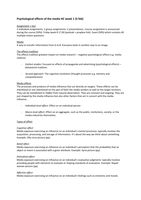Assignment + test
2 Individual assignments, 2 group assignments, 2 presentations. Course assignment is announced
during the course (50%). Friday week 8 17.00 (postvak + propbox link). Exam (50%) which contains 40
multiple choice questions.
Media
A way to transfer information from A to B. Everyone looks in another way to an image.
The effects tradition
The effects tradition greatest impact on media research – negative psychological effects e.g. media
violence.
- Earliest studies: Focused on effects of propaganda and advertising (psychological effects) –
behaviorist tradition.
- Second approach: The cognitive revolution (thought processes e.g. memory and
comprehension)
Media effects
The processes and products of media influence that act directly on targets. These effects can be
intentional or non intentional on the part of both the media senders as well as the target receivers.
They can be manifested or hidden from natural observation. They are constant and ongoing. They are
just shaped by the media influence but also other factors that act in concert with the media
influence.
- Individual-level effect: Effect on an individual person
- Macro-level effect: Effect on an aggregate, such as the public, institutions, society, or the
media industries themselves.
Types of effect
Cognitive effect
Media exposure exercising an influence on an individual’s mental processes; typically involves the
acquisition, processing, and storage of information. It’s about the way we think about something.
Example: Zika virus picture (pp).
Belief effect
Media exposure exercising an influence on an individual’s perception that the probability that an
object or event is associated with a given attribute. Example: Syria picture (pp).
Attitudinal effect
Media exposure exercising an influence on an individual’s evaluative judgments: typically involves
providing people with elements to evaluate or shaping standards of evaluation. Example: Raped
woman picture (pp).
Affective effect
Media exposure exercising an influence on an individual’s feelings such as emotions and moods.


